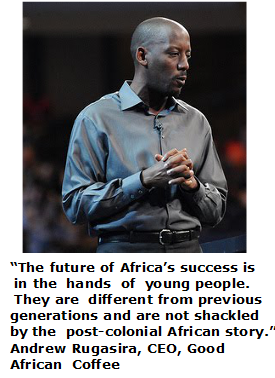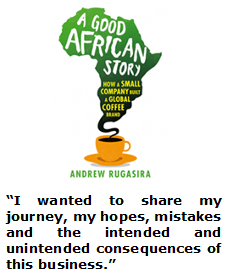 ReConnect Africa is a unique website and online magazine for the African professional in the Diaspora. Packed with
essential information about careers, business and jobs, ReConnect Africa keeps you connected to the best of Africa.
ReConnect Africa is a unique website and online magazine for the African professional in the Diaspora. Packed with
essential information about careers, business and jobs, ReConnect Africa keeps you connected to the best of Africa.



“The future of Africa’s success is in the hands of young people.” The Ugandan founder of Good African Coffee, Andrew Rugasira, launches a new book that shares his personal experiences as an African entrepreneur.
 The Ugandan founder of Good African Coffee, Andrew Rugasira, launches a new book that shares his personal experiences as an African entrepreneur
The Ugandan founder of Good African Coffee, Andrew Rugasira, launches a new book that shares his personal experiences as an African entrepreneurSince its founding in 2003, Good African Coffee has helped thousands of farmers earn a decent living, send their children to school and escape a spiral of debt and dependence.
Good African Coffee
As a firm believer that trade, rather than aid, is the only viable strategy for Africa’s economic and social development, Andrew Rugasira put his belief into practice when he set up Good African Coffee in 2003. Convinced that it was time for Africans to process and market their own products globally, he and a small team began to organise coffee farmers into producer groups. Following an intensive training programme, the farmers were able to produce high quality Arabica coffees that provided a better return on their harvest. Today, the company has more than 14,000 farmers within its network of suppliers.
Following its sales in South Africa in 2004, Good African was the first African-owned coffee brand to be listed in UK supermarkets in 2005 when Waitrose became the first British chain to list Good African roast and ground coffees, followed in 2006 by Sainsbury. In the main, processing and value addition of African produce has taken place outside Africa. Good African changed this approach when it set up a roasting and packaging facility in Kampala in 2009. By processing the coffee in Uganda, where it is grown, the company retains a greater proportion of the value addition and, as a result, is better able to support the farmers and empower their communities.
The Story
In his new book, ‘A Good African Story’, Andrew Rugasira charts the obstacles he and his company faced: from the seemingly impossible task of finding capital, facing prejudice and discrimination, to close calls with lions in the foothills of the Rwenzori Mountains. In the book, he argues that trade has achieved what years of aid failed to deliver, and has provided a tantalising glimpse of what Africa could be.
Educated at SOAS, University of London and Oxford, Rugisara is an example of the diasporan African who returns to Uganda to apply his learning and skills in developing his country. As he recounts the very personal story of his company and the challenges that he has faced – and overcome – as an African entrepreneur, Rugasira discusses the barriers that prevent fair and equal trade between Africa and the rest of the world. He sets out the arguments for reducing dependency on hand-outs and builds up a manifesto for a revolution in the way that Africa is perceived. This is a book about Africa taking its destiny in its own hands, and dictating the terms of its future.
In his new book, ‘A Good African Story’, Andrew Rugasira charts all the obstacles he and his company faced: from the seemingly impossible task of finding capital, facing prejudice and discrimination, to close calls with lions in the foothills of the Rwenzori Mountains.
At the UK launch of his book earlier this year at SOAS in London, Rugasira outlined some of his reasons for writing the book. “The book describes the challenge of setting up a coffee roasting factory in Uganda and adding value to products within Africa. It is about some of the realities of doing business in the rural economy where there is no access to markets, to infrastructure and to capital. That was the situation before we were able to mobilise a network of 14,000 farmers. Now we roast and harvest the coffee beans in Kampala and they are sold in Tesco in the UK.”
The Africa Business Story
When it comes to Africa, Rugasira said, there are two conversations going on. “The McKinsey conversation that talks about Africa as open for business. But that really focuses on the extractive industries and these generally do not churn out jobs or provide opportunities across the wider community.

“The other is the handouts approach; the Africa framed by charities and aid. The aid business removes accountability of the governments to the people and puts it somewhere else than the people they are accountable to. It also takes away the dignity of people and no amount of charity, however well-meaning, has ever caused the economic growth of a country. All the farmers in our network have decided to believe in their dignity and not in handouts.”
Rugasira pointed out that tariffs are not the only barrier to business. “There are a lot of non-tariff barriers blocking our efforts. The book talks about the reality of raising capital and getting banks to fund things that haven’t been done before. I became, in this book, the stenographer for a lot of experiences that Africa entrepreneurs are going through in these markets.
“The book shares the lessons about how difficult it is to get African exports into the European market. There is a lot of rhetoric about the opportunities for Africa but the realities didn’t seem to be coming through. Because African businesses were not communicating their real experiences, the rhetoric was not being challenged and the realities and frustrations were not seen. I made 14 trips to the UK and spent over 2 years trying to convince UK supermarkets to take Good African Coffee.”
Sharing Stories
“I wrote this book because African businesses are rarely written about,” Rugasira said. “Without the experiences of these businesses being recorded, we lose the intellectual capital that feeds the juices of the next generation of entrepreneurs and spurs them on. “It was also a case of setting out the myth versus the reality. The private sector is the engine of growth but we haven’t visited the engine room to see what is really going on. “In the case of agriculture in Africa, only 4% of loans are going to agriculture. Then there are the realities of the real cost of doing business from Africa; the procedures that constrain people from doing business in the global market. Issues such as the difficulties in getting visas increase difficulties around mobility and trading across borders.”
‘A Good African Story’, he says, “seeks to record some of the experiences African businesses go through when trying to do business. It is also to encourage the youth. The future of Africa’s success is in the hands of young people. They are different from previous generations and are not shackled by the post-colonial African story. They want jobs, service delivery, infrastructure, opportunities to create wealth. Therefore if we encourage young people and entrepreneurs, they will see how they can change their lives and bring prosperity to their lives and communities.</p>
“I wanted to share my journey, my hopes, mistakes and the intended and unintended consequences of this business. I hope that it will encourage them.”
Learning Lessons
Technology, said Rugasira, offers opportunities today to bridge the gap in manufacturing in Africa. He sourced technology for his roasting plant from Turkey and bought the packaging plant in China, assembling it in Uganda. Other emerging economies, he said, are where African entrepreneurs can source ideas and technology – simply by using the power of the data available on the internet. “Technology is opening up avenues for enterprise,” he said. “E-mail doesn’t need a visa. So these platforms are going to help us create new businesses. The demographics show that the dominant population will be young people. The percentage of young people on the continent is increasing rapidly and these are people who are impatient, want jobs, infrastructure and service delivery.
The lesson he and his partners learned, he said, is that it is all about knowledge. “What we learned is that you have to provide the knowledge to be able to grow the crops profitably and sustainably and then transfer the knowledge about how the farmers can better organise themselves, save together, put in place protocols, procedures and risk management.\u201D
“Technology is opening up avenues for enterprise.….e-mail doesn’t need a visa. So these platforms are going to help us create new businesses.
With 60% of arable land in the world in Africa, Rugasira is convinced that agriculture can add significantly to the economic growth of a country. He cautioned against those who adopt a patronising approach to small-scale farming – “these people have the same ambitions and aspirations for themselves and their families as anyone else.”
Time and Patience
Things will change, Rugasira said, but change will not occur overnight. “It’s going to take time, perseverance and getting a break from someone prepared to take a chance. The more African-owned brands we have on the shelf, the more seriously we will be taken. We just need to keep banging at it.” Entrepreneurs need to be persistent, he added, citing Howard Schultz who went to more than 400 financial institutions to raise money to set up Starbucks. In the end, it was his dentist and others like him that provided the first financing. Good African Coffee, Rugasira said, works on the basis of mutual trust and collaboration.
“I don’t believe in putting contracts on farmers. We have 14,000 farmers and I couldn’t enforce contracts. We have to have a relationship and it must be rooted in dignity and respect and value. They must value it and I must value it and, if that’s the case, we don’t need a piece of paper to prove it. They are people too, and sometimes exposing our vulnerabilities also serves to create the relationships we now have today. As we scale up, this might become an issue but for us, now, this is not an issue.” The social return has also resulted in support for gender empowerment. “20-25% of our 14,000 farmers are women,” he said. “They have proven to be the most effective in making savings, investing funds and getting the economic returns. We focus a lot on the women’s groups now.”
Africa offers enormous investment opportunities, Rugasira said, but expectations need to be managed. “These are young, fragile, emerging economies. The entrepreneurial drive is there, the persistence is there. We just have to look at it differently. Africa doesn’t lack entrepreneurs. It lacks people who understand Africa’s entrepreneurs. You can’t help someone standing up; you need to bend down so you can help them. It’s about becoming more humble, more sensitive to the context, understanding the gifts and talents of the people and investing in them. It’s all part of a learning process and being cogniscent of the fact that these things take time. I’m very optimistic about Africa. We need to challenge the issues of the decision makers head on; equip people with the data to argue and we have just got to keep going.”
Read more about the story of Good African Coffee
